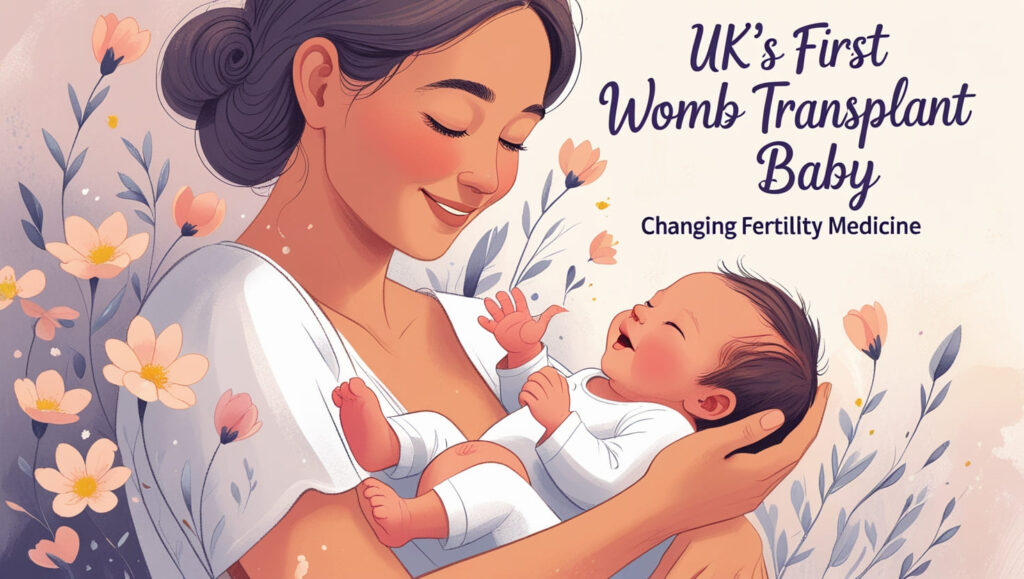Introduction
In a groundbreaking development that has captured the attention of the medical community and hopeful parents alike, the United Kingdom recently celebrated the birth of its first baby born from a womb transplant. This remarkable achievement not only marks a significant milestone in reproductive medicine but also opens new avenues for understanding and addressing infertility issues. This article explores the implications of this pioneering procedure, the journey of the first womb transplant baby, and how it is poised to transform fertility medicine.
Understanding Womb Transplants
What is a Womb Transplant?
A womb transplant, also known as uterine transplantation, is a surgical procedure that involves transplanting a healthy uterus into a person who does not have one or has a uterus that is not functioning properly. This procedure is primarily aimed at women with congenital uterine absence (Müllerian agenesis), those who have undergone hysterectomy, or those with severe uterine abnormalities.
The Procedure
The process typically involves several stages:
- Selection of Donor and Recipient: A suitable donor, often a living relative or a deceased donor, is identified. The recipient must undergo extensive medical evaluations to ensure they are fit for surgery.
- Surgical Transplantation: The surgical procedure can take several hours and is performed under general anesthesia. The donor uterus is carefully removed and implanted into the recipient.
- Post-Operative Care: After the surgery, the recipient must take immunosuppressive medications to prevent rejection of the transplanted organ. This phase is critical for the success of the transplant.
- Fertility Treatment: Once the uterus has been successfully integrated and is functioning, the recipient can undergo in vitro fertilization (IVF) to conceive.
- Pregnancy and Delivery: If successful, the pregnancy will be monitored closely, and the baby can be delivered via cesarean section.

The Journey of the UK’s First Womb Transplant Baby
A Historic Milestone
In early 2025, the UK witnessed a historic moment when the first baby was born from a womb transplant. This event was the culmination of years of research and clinical trials aimed at making womb transplants a viable option for women facing infertility due to uterine issues. The birth was celebrated not only by the medical team involved but also by countless families who have struggled with infertility.
The Parents’ Story
The parents of the womb transplant baby, who had faced years of heartache and disappointment in their journey to parenthood, shared their emotional story. The mother, who had been born without a uterus, had always dreamed of carrying her own child. After learning about the possibility of a womb transplant, she and her partner decided to pursue this option, which led them to a pioneering fertility clinic in the UK.
The couple underwent rigorous screening and preparation, and after a successful transplant, they were overjoyed to learn they were expecting. The pregnancy was closely monitored, and despite some challenges, the couple welcomed a healthy baby into the world, fulfilling their dream of parenthood.
Implications for Fertility Medicine
Expanding Options for Women
The birth of the UK’s first womb transplant baby signifies a monumental shift in the options available for women experiencing infertility. For many, traditional methods such as IVF may not be sufficient, especially for those with uterine abnormalities. Womb transplants provide a new avenue for these individuals, offering hope where there was once despair.
Ethical Considerations
As with any medical advancement, womb transplants raise ethical questions. The process involves complex considerations regarding organ donation, consent, and the long-term health of both the mother and child. Medical professionals and ethicists are now tasked with navigating these complexities to ensure that the procedure is conducted ethically and responsibly.
Psychological Impact
The psychological implications of womb transplants are profound. For many women, the ability to carry a child is tied to their identity and sense of self. The success of womb transplants can significantly impact mental health, providing emotional relief and fulfillment for those who have longed for the experience of pregnancy.
The Future of Womb Transplants
Research and Development
The success of the first womb transplant baby in the UK is likely to spur further research and development in this field. Medical professionals are eager to refine techniques, improve surgical outcomes, and expand eligibility criteria for potential recipients. Ongoing studies will focus on long-term health outcomes for both mothers and children born from womb transplants.
Global Perspective
Womb transplants are not unique to the UK; several countries have already conducted successful procedures. However, the UK’s achievement may encourage more widespread acceptance and implementation of this procedure globally. As awareness grows, more clinics may begin to offer womb transplants as a viable option for women struggling with infertility.
Technological Advancements
Advancements in medical technology will also play a crucial role in the future of womb transplants. Innovations in surgical techniques, imaging, and immunosuppressive therapies will enhance the success rates of these procedures. Additionally, research into bioengineering and artificial wombs may one day provide alternative solutions for infertility.
Conclusion
The birth of the UK’s first womb transplant baby is a transformative moment in the field of fertility medicine. This achievement not only brings hope to countless women facing infertility but also challenges the medical community to continue pushing the boundaries of what is possible. As we look to the future, the implications of this procedure will resonate far beyond the walls of the operating room, influencing medical practices, ethical discussions, and the lives of families for generations to come.
The journey of the first womb transplant baby serves as a testament to human resilience and the relentless pursuit of dreams. It is a reminder that, with innovation and compassion, the possibilities for expanding family life are greater than ever before.


